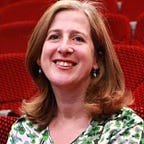A Shared Responsibility to Create Smarter Aid Systems.
Last Monday was Rosh Hashanah, the Jewish new year. This Wednesday was Yom Kippur, the day of Atonement. In the Jewish faith, the ten days that fall between them are a time for reflection. I’m fortunate to belong to a Jewish humanist congregation that also uses these days of awe as an opportunity to consider our role as individuals in tikkun olam, the healing of the world. Given that NeedsList was born five years ago on Rosh Hashanah, these words from our Rabbi on Wednesday resonated strongly with me:
“If we exaggerate our own importance we might believe that the work of tikkun (healing) rests solely on our own shoulders, and is therefore too heavy to even commence. If we underestimate our own importance we may feel that we have too little to contribute and hesitate to join in the work. But, when we see ourselves as part of a community of individuals, all with shared responsibility, we may find the determination to act.”
Oraynu Congregation for Humanistic Judaism
As I reflect upon how we have developed NeedsList as a company,our success has been built brick by brick on building relationships in our community: with individuals and institutions who have a dogged determination to take action and share the responsibility of fixing an outdated and inadequate aid system. These relationships have put humans squarely at the center of the technology — giving us the strength, the wisdom, and the power to move forward.
The Power of Human Connection
When we started NeedsList we had zero money, we couldn’t code, and I thought a pitch was something on a baseball field. But what we did have was a deep understanding of the power of networks — and the ability to make connections. Without these partnerships, and the relationships that underpin them, we wouldn’t have gotten this far.
The scale of the problems we are facing as a society is daunting. We’re looking at the risk of this climate emergency leading not only to displacement, but potential extinction. We need to take on these solutions with an unprecedented urgency, and there’s no way any of us can do it alone. To make a true impact, we must continue to take risks, to partner in unexpected places, and to come together forcefully. We can’t afford not to.
— -
